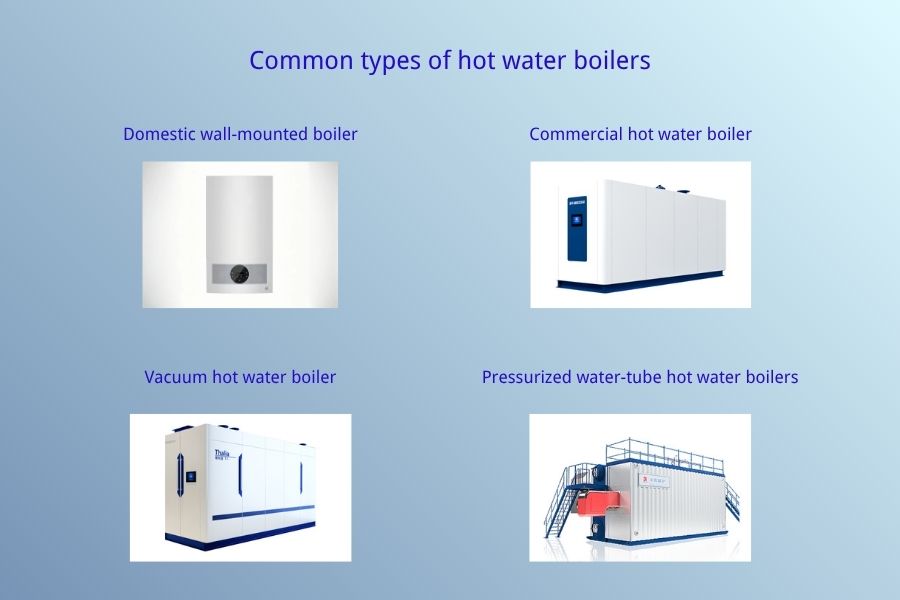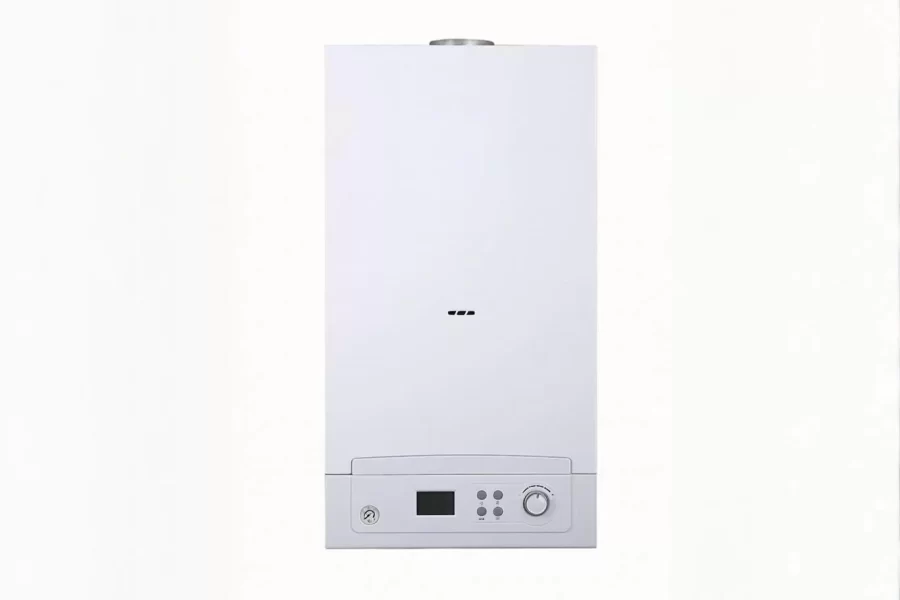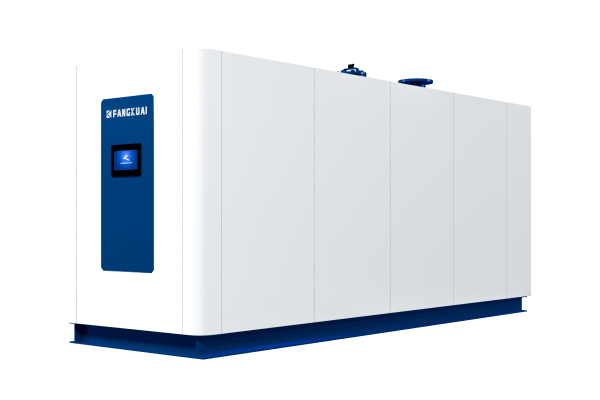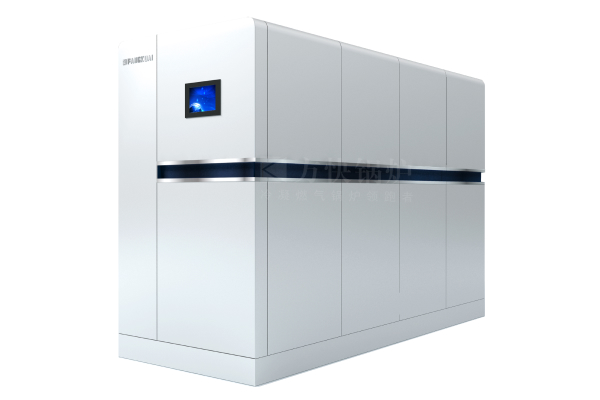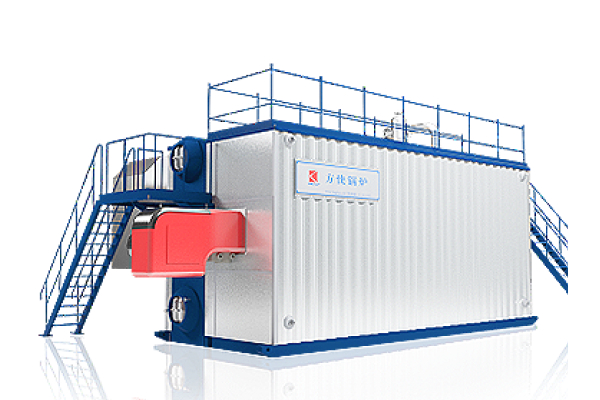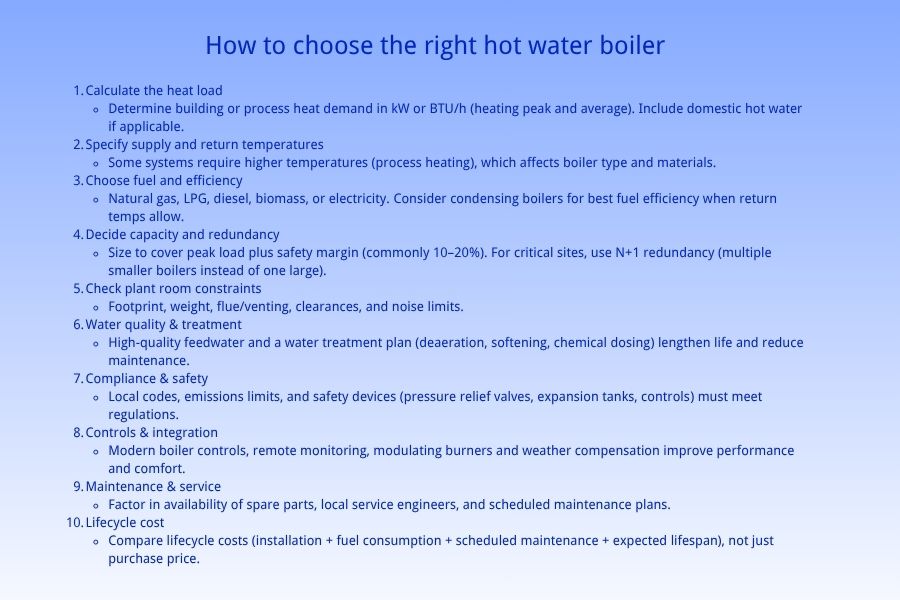Learn about common types of hot water boilers: residential wall-mounted, commercial atmospheric pressure, vacuum, and industrial water tube boilers. Includes application comparisons and selection tips to help you quickly choose the right boiler.
What is a hot water boiler? What can it do?
Consult hot water boiler price
A hot water boiler is a closed heating device that heats water and circulates it through a piping and radiator (or heat-exchanger) system to provide space heating, process heat, or hot water for domestic or commercial use. Unlike steam boilers, hot water boilers keep the water in the liquid phase and use pumps to deliver heat.
Typical uses:
-
Central heating for homes, apartments and commercial buildings
-
Domestic hot water supply (with buffer/storage or in combination with heat exchangers)
-
Process heating in factories, laundries, food plants and sterilization systems
-
Space heating in hotels, hospitals, schools and offices
Advantages of hot water systems include even temperature control, lower distribution losses than many air systems, and generally simpler equipment than steam systems for similar low- and medium-temperature needs.
Common types of hot water boilers
Below are the four types you asked to cover. For each I give a short description, typical applications, strengths and limitations.
1. Domestic wall-hung (wall-mounted) hot water boilers
Compact wall-hung gas hot water boiler
A domestic wall-hung hot water boiler is a compact, factory-assembled heating unit designed mainly for homes and small apartments; many modern models are condensing wall-hung boilers that provide both space heating and domestic hot water in a single, space-saving package. Typical capacity ranges from about 12 kW to 60 kW, making these hot water boilers ideal for single-family houses and small multi-family units.
Advantages: compact and easy to install; high seasonal efficiency when condensing; integrated controls and combi options for hot water.
Limitations: limited maximum output (not suitable for large buildings); requires proper flue/condensate arrangements for condensing units; shorter service life if used beyond design intent.
2. Commercial hot water boilers (low-/atmospheric-pressure)
Commercial Hot Water Boilers – D6 Series
A commercial hot water boiler (often floor-standing and described as low- or atmospheric-pressure in HVAC contexts) is built for larger heating loads in hotels, schools and medium-sized commercial buildings. Capacities typically start in the few-hundred-kW range and can reach several MW when multiple commercial hot water boilers are paralleled for redundancy.
Advantages: designed for continuous operation and larger loads; modular arrangement and easier servicing; good cost-to-performance balance for commercial HVAC.
Limitations: larger footprint than wall-hung units; can be less efficient than modern condensing industrial designs if not specified correctly; requires professional installation and water treatment.
3. Vacuum hot water boilers
Vacuum hot-water boiler – T6 series
A vacuum hot water boiler operates under below-atmospheric pressure inside a sealed vessel, which reduces oxygen ingress and scale formation and therefore lowers corrosion and maintenance needs. These hot water boilers are frequently chosen for hotels, hospitals and compact plant rooms where safety, low corrosion and quiet operation matter.
Advantages: inherently safer due to low internal pressure; reduced oxygen-related corrosion and scale; compact plant-room footprint and simpler venting in some setups.
Limitations: higher initial cost and requirement for vacuum equipment and tight seals; limited suitability for very large industrial loads; needs skilled technicians for vacuum-system maintenance.
4. Industrial pressurized water-tube hot water boilers
SZS water-tube hot water boilers
An industrial pressurized water-tube hot water boiler circulates water through tubes heated by combustion gases, a design that supports very high outputs and elevated temperatures for heavy industrial or district heating applications. These boilers commonly range from several MW to tens of MW and are used in chemical plants, manufacturing facilities and large hospitals.
Advantages: very high output and power density with fast response to load changes; robust for continuous heavy-duty operation; straightforward to design with redundancy and staged operation.
Limitations: higher capital cost and more complex auxiliary systems (feedwater treatment, pumps, safety valves); requires rigorous water treatment and trained operators; larger maintenance overhead.
Which type of hot water boiler is best?
There is no single “best” boiler — the right choice depends on your application and constraints. Quick guidance:
-
Homes / small apartments: Wall-hung condensing boilers (combi or boiler + cylinder) are usually best for compactness and efficiency.
-
Hotels, schools, medium commercial: Commercial floor-standing condensing hot water boilers or modular commercial units (paralleled) for redundancy.
-
Safety-sensitive, low-maintenance needs: Vacuum hot water boilers can be advantageous (lower corrosion, safer low-pressure operation).
-
Large industrial or district heating: Water-tube pressurized hot water boilers for reliability and capacity.
Think in terms of fit for purpose (capacity, footprint, fuel, required temperatures) and total cost of ownership (install + fuel + maintenance + lifetime), not just upfront price.
How to choose the right hot water boiler — a practical checklist
Finding the best hot water boiler
-
Calculate the heat load
-
Determine building or process heat demand in kW or BTU/h (heating peak and average). Include domestic hot water if applicable.
-
-
Specify supply and return temperatures
-
Some systems require higher temperatures (process heating), which affects boiler type and materials.
-
-
Choose fuel and efficiency
-
Natural gas, LPG, diesel, biomass, or electricity. Consider condensing boilers for best fuel efficiency when return temps allow.
-
-
Decide capacity and redundancy
-
Size to cover peak load plus safety margin (commonly 10–20%). For critical sites, use N+1 redundancy (multiple smaller boilers instead of one large).
-
-
Check plant room constraints
-
Footprint, weight, flue/venting, clearances, and noise limits.
-
-
Water quality & treatment
-
High-quality feedwater and a water treatment plan (deaeration, softening, chemical dosing) lengthen life and reduce maintenance.
-
-
Compliance & safety
-
Local codes, emissions limits, and safety devices (pressure relief valves, expansion tanks, controls) must meet regulations.
-
-
Controls & integration
-
Modern boiler controls, remote monitoring, modulating burners and weather compensation improve performance and comfort.
-
-
Maintenance & service
-
Factor in availability of spare parts, local service engineers, and scheduled maintenance plans.
-
-
Lifecycle cost
-
Compare lifecycle costs (installation + fuel consumption + scheduled maintenance + expected lifespan), not just purchase price.
Conclusion
Choosing the right hot water boiler means matching the boiler’s characteristics to the building or process requirements: capacity, temperatures, fuel, footprint, safety expectations and lifecycle cost. For homes, compact wall-hung condensing boilers usually win; for larger commercial buildings, modular commercial boilers or vacuum boilers may offer advantages; for heavy industrial demand, water-tube pressurized boilers are the standard. Use a heat-load calculation, plan for water treatment and controls, and specify redundancy where downtime is costly.
FAQ
Q: How long does a hot water boiler typically last?
A: With proper installation and water treatment, domestic boilers last ~10–15 years; commercial and industrial boilers can last 15–30 years or longer with good maintenance.
Q: Are condensing boilers always better?
A: Condensing boilers are more fuel-efficient when return temperatures are low enough to condense flue gases. If your system has high return temps, condensing benefits are reduced unless you redesign distribution or add plate heat exchangers.
Q: Do vacuum boilers need more maintenance?
A: They require specific attention to seals and the vacuum system, but they often reduce corrosion-related maintenance. Skilled technicians are needed for repairs.
Q: What water treatment is required?
A: At minimum, deaeration (oxygen removal), hardness control (softening or dosing), and chemical inhibitors for closed systems. Industrial boilers may require makeup water conditioning and continuous monitoring.
Q: Can I replace a steam boiler with a hot water boiler?
A: Possibly — but you must rework piping, controls and equipment because steam and hot water systems operate differently (pressures, temperatures, condensate handling). Consult an HVAC/boiler engineer.
Q: How do I size a boiler for my building?
A: Perform a heat loss calculation (by room or building), add margin for extreme conditions, and select a boiler (or modular boilers) whose modulating range matches the load pattern. I can help estimate if you provide basic building data (area, insulation, climate, desired indoor temp).
Get your best price
Quickly compare 3 FREE quotes
- Engineer quick quote
- The overall delivery speed is fast
- Financial choice
- Low installation costs and cost savings
25 years+ of boiler R&D
More than 20 innovative technologies

